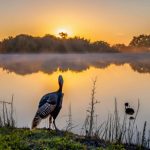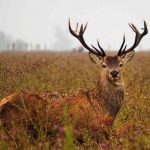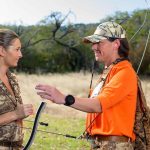Alabama is home to a wide variety of wildlife, including secretive turkeys, beautiful whitetail deer, cottontail rabbits, and ducks skimming crystal-clear lakes. But for a safe and pleasurable experience, familiarize yourself with Alabama’s hunting laws before venturing into the woods. This thorough book explores the fundamental laws and guidelines that you must be aware of in order to have a successful and law-abiding hunt.
| Aspects | Key Rules |
|---|---|
| Proximity to Public Roads | • Avoid hunting or discharging firearms within 50 yards of public roads with certain firearms. • Specifically impacts deer hunters, prohibiting deer harvest within the restricted area using specified weapons. |
| Hunter Education Requirement | • Mandatory completion of an approved hunter education course for license buyers (16 or older) born after August 1, 1977, with exceptions for certain individuals. • Options for in-person classes or online courses, available for individuals aged 10 and above. |
| Supervision Required License | • Option for those born after August 1, 1977, who haven't completed hunter education but desire to hunt. • Requires direct supervision by a licensed adult hunter, maintaining proximity and normal voice control. |
| Definition of Hunting | • Encompasses pursuing, shooting, killing, capturing, and trapping wild animals and birds, including acts of assistance. • Broad definition covers various activities related to the taking of wildlife. |
| Hunting Permission Requirement | • Illegal to hunt on another person's land without written permission from the landowner or person in control unless accompanied by the landowner or a guest. |
| Types of Hunting Lands | • Division into private-owned and leased land and open permit-public land. • Open permit-public land includes government-owned land and individually accessible lands. |
| Legal Hunting Hours | • Resident game birds and game animals allowed during daylight hours in open season, with specified hours for migratory game birds and waterfowl. |
| Hunter Orange Requirement | • Mandatory during specific gun deer seasons, youth deer season, and muzzleloader deer season, with exceptions for certain situations. • Must be worn during foot travel between vehicles and stands if the distance is over 20 feet. |
| Designated Game Animals | • Designated game animals include bear, deer, fox, raccoon, and more. • Specific regulations apply to each species to manage hunting activities. |
| Designated Game Birds | • Designated game birds encompass bobwhite quail, wild turkey, and various migratory species. • Protection granted to all birds except specified ones, ensuring conservation. |
| Designated Furbearing Animals | • Designated furbearing animals include beaver, bobcat, fox, and others, each subject to specific regulations. • The balance between hunting opportunities and conservation of furbearing species. |
| Archery Specifications | • Legal bows for hunting include longbows, recurve bows, compound bows, or crossbows. • Stringent specifications on peak tension, broadhead characteristics, and restrictions on light-projecting attachments. |
| Running Dogs | • Permission for running deer with dogs during specific periods and regions. • Licensed hunters allowed to run squirrel and rabbit during closed seasons without firearms. |
| Sale of Game Birds & Animals | • Prohibition on selling any game bird or game animal or any parts, with exceptions for specific items derived from lawfully taken animals. • Balancing conservation efforts with limited exceptions for finished products. |
| Importation of Live Deer and Elk | • Stringent prohibition on importing live members of the deer family into Alabama. • Measures in place to prevent the transmission of diseases and protect native deer herds. |
| Reporting Bands | • Importance of reporting banded bird recoveries for wildlife management and conservation. • Online reporting system available for hunters to contribute valuable information. |
| Wildlife Management Areas | • Management of 35 Wildlife Management Areas (WMAs) for public hunting opportunities, each subject to specific regulations. • Licensing requirements for hunters accessing WMAs to maintain sustainable wildlife populations. |
| Special Opportunity Areas | • 13 Special Opportunity Areas (SOAs) providing unique public land hunting opportunities through a selection process. • Limited quota random computerized draw hunts ensuring fair access to hunters. |
| Physically Disabled Hunters | • Designated areas reserved for physically disabled hunters during gun deer season, requiring advance reservations and specific qualifications. • Efforts to provide accessible hunting opportunities for individuals with physical disabilities. |
| Special Youth Hunts | • Scheduled special deer, turkey, and waterfowl hunts for youth with specific regulations. • Emphasis on adult supervision and safety measures during youth hunting experiences. |
| Youth Dove Hunts | • Exclusive youth dove hunts with adult accompaniment designed to maximize youth participation and mentoring. • Initiatives to foster a safe and educational environment for young hunters. |
| Shooting Ranges and Archery Parks | • Operation of 12 shooting ranges and 20 archery parks providing safe environments for firearm and archery practice. • Licensing requirements for residents and non-residents, ensuring responsible use of public facilities. |
| Treestand Safety Measures | • Mandatory use of a full body harness for treestand users on Wildlife Management Areas. • Additional safety tips to prevent injuries and ensure responsible treestand use. |
| Deer Management Program | • Alabama Cooperative Deer Management Assistance Program (DMAP) aiding private landowners in intensifying deer management. • Collaboration with wildlife biologists and conservation enforcement officers to implement effective deer management plans. |
| Forever Wild Program | • Adoption by Alabama voters in 1992 to set aside land for permanent state ownership using offshore natural gas profits. • Goals to provide public land for various recreational activities and conserve natural resources. |
| Nongame Wildlife Program | • Conservation efforts for nongame animals through the Nongame Wildlife Program since 1984, funded by donations and hunting license fees. • Focus on preserving the diverse range of nongame species native to Alabama. |
Important AL Game Resources
Hunting Practices That Are Forbidden
- Hunting deer or turkey without a harvest record or reporting all harvests on Game Check is forbidden.
- Hunting game animals beyond their escape routes is illegal.
- Unless licensed before 2006, hunting exotic species such wild goat, sheep, deer (other than white-tailed or fallow), and elk is forbidden.
- Hunting in baited/fed areas is restricted for 10 days following removal, except for white-tailed deer and feral swine baiting privilege licensees.
- Unless a species has authorized evening seasons, shooting game animals or birds with a weapon or bow is forbidden.
- Elevated tree stands may be used to hunt other lawful game animals and birds with bows or rifles, but not turkeys.
- Taking deer from state waterways, dead or alive, is illegal.
- Decoys for migrating birds and turkeys cannot be real.
- Doves, turkeys, and ducks cannot be called electronically, unless during predator hunting season.
- Any hunting using fire or smoke is forbidden.
- Hunting resident birds or animals in floods, backwaters, or islands under 40 acres is illegal.
- Hunting or firing within 50 yards of highways or railroads is illegal.
- Willfully lighting real property from a vehicle between sunset and morning is illegal.
- Vehicles, ATVs, planes, boats, and other mechanical equipment cannot be used to hunt.
- Using gasoline or other toxic substances to force animals from burrows, dens, or retreats is banned.
- Killing unantlered deer outside of season is illegal.
- Turkey hunting using moving or sound-producing decoys is restricted in the first 10 days of spring turkey season.
- It is illegal to take more than the daily bag limit for any game bird or animal.
- The import, possession, sale, or promise to sell live designated species is illegal.
- Releasing tame or wild turkeys into state forests is illegal.
- Only handguns for personal defense may be used to hunt deer during the preliminary archery-only season.
- Hunters cannot use laser sights, attachments, or light sources that send beams ahead of firearms or bows.
- Poisoning or explosively hunting wildlife is unlawful.
- Live wild pigs are illegal to own or release.
- Unpermitted hunting or firearm discharge within 100 yards of a habitation or structure is illegal.
Latest posts by John Lewis (see all)
- New Jersey Hunting Seasons 2024 New Dates & Regulations - September 15, 2024
- Delaware Hunting & Trapping Seasons Summary 2024 - September 4, 2024
- 2024-2025 Colorado Hunting: New Big Game Season Dates! - August 28, 2024




